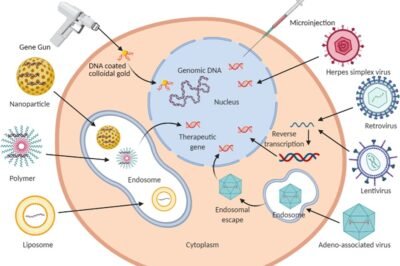The transformative power of biotechnology in medicine is reshaping the future of healthcare, offering unprecedented solutions to complex medical challenges. From revolutionary gene editing techniques to targeted therapies for cancer, biotechnology is driving advancements that were once unimaginable. The integration of modern tools such as CRISPR technology is not only improving our ability to treat diseases but also enabling the development of personalized medicine, ensuring that treatments are tailored to the unique needs of individuals.
Gene Editing: The Frontier of Medical Innovation
One of the most significant advancements in biotechnology in medicine is gene editing. This process involves altering an organism’s DNA to correct mutations, remove harmful genes, or introduce beneficial ones. The most well-known and widely used tool for gene editing is CRISPR technology (Clustered Regularly Interspaced Short Palindromic Repeats). CRISPR allows scientists to precisely target and modify specific sections of the DNA, offering hope for curing genetic disorders such as cystic fibrosis, muscular dystrophy, and sickle cell anemia.
Biotech Advancements in Cancer Treatment
Cancer treatment breakthroughs have been at the forefront of biotechnology in medicine. Biotechnology has enabled the development of immune checkpoint inhibitors and CAR-T cell therapy, both of which have shown remarkable success in treating certain types of cancer, such as leukemia and melanoma. These therapies work by either enhancing the immune system’s ability to detect and destroy cancer cells or by genetically modifying a patient’s own T cells to target tumors.
Another promising area in cancer treatment breakthroughs is the development of precision medicine, where genetic information about a patient’s tumor is used to tailor treatment specifically to their cancer type.
Personalized Medicine: Tailoring Treatments to Individuals
The concept of personalized medicine has gained significant traction with the rise of biotechnology in medicine. This method is particularly impactful in treating complex diseases like cancer, diabetes, and cardiovascular conditions, where individual variations can significantly influence treatment outcomes.
For example, genetic testing can reveal how a patient might respond to certain medications, allowing doctors to prescribe the most effective drugs while avoiding adverse reactions. Similarly, biotech advancements in pharmacogenomics are helping develop drugs tailored to specific genetic profiles, increasing the success rates of treatments and reducing side effects.
The Future of Biotechnology in Medicine
As biotechnology in medicine continues to advance, its potential applications are expanding into areas like regenerative medicine, where scientists are using stem cells and tissue engineering to repair or replace damaged organs. This could offer solutions for currently untreatable conditions, such as spinal cord injuries and degenerative diseases.
Additionally, biotech innovations are driving the development of new vaccines and therapies for infectious diseases, as seen in the rapid development of COVID-19 vaccines using mRNA technology. These breakthroughs highlight the speed and precision with which biotechnology can respond to global health challenges.
Conclusion
The role of biotechnology in medicine is ushering in a new era of healthcare, characterized by innovations such as gene editing, CRISPR technology, and personalized medicine. These advancements are leading to more effective treatments, particularly in areas like cancer treatment breakthroughs, and are changing the way we approach disease prevention and management.








Leave a Reply